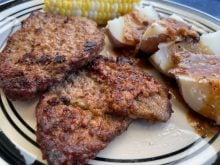DUNCAN, B.C. – There is a “do not enter” sign along the road leading into Ian and Jen Woike’s farm.As operators of the largest egg farm on Vancouver Island, the Woikes carefully guard the health of their 44,000 laying hens.But despite the dangers, the Woikes open their Duncan, B.C., farm to school and community tours and government officials to explain modern egg production and common farm practices.”We can tell people why we do things the way we do. Food safety is the top motive here. You are not going to get ill eating our product,” said Jen.Biosecurity and food safety starts on the farm with regular Canadian Food Inspection Agency visits.Their farm practices earned them British Columbia’s 2009 outstanding young farmer award. They knew little about the program until they joined but are now helping organize the national event this November in Victoria.Ian’s father, Ben, started the farm in 1981 with an 8,000-bird quota. The egg farm is called Running W Egg Farm, while the wholesale division is Farmer Ben’s Eggs, which sells to about 300 customers. That includes local grocery stores and restaurants, as well as the national department of defence.They have a private grading station and sell white and brown eggs as well as dark yolk eggs, achieved by feeding the hens corn. They import about 40 tonnes of corn each week from the United States because they can’t find enough locally. “We are marketing to a broad range. It would be nice to have more than two products but we can’t. We’re probably still selling ourselves short. We still need to carry more, there’s free range, there’s organic, there’s omega 3. There’s a lot we are not involved with yet,” Ian said.He earned a millwright diploma and worked off farm but returned as his father’s partner in 1992. The senior Woike is edging toward retirement and Ian and Jen took over full time nearly 10 years ago. In that time, they expanded their supply management quota to 44,000 birds and added land so the farm is now about 400 acres.Land in the region sells for as much as $35,000 per acre. The farm is split into several units, all within a five kilometre radius of the home place. Besides the layers, they keep about 80 Angus cows and Jen raises Quarter horses.Manure from the poultry operation fertilizes the land, allowing them to produce more than 20,000 bales of hay each year without irrigation.International events influenced them to start wholesale and grading divisions to protect the farm and their customer connections if supply management is lost at the World Trade Organization negotiating table.”We wanted to have that tie directly to the customer. Once you’ve got the customer, the world could fall apart around you because they still want eggs,” Ian said.They sell more than 40 percent of their eggs directly to consumers, including through an on-farm store where customers get their eggs from the refrigerator and put money in an honour box.Woikes are among the few full-time farmers in the Cowichan Valley, where there are a number of niche farms that do not rely on agriculture for their entire income. That prompted them to create an education program to explain their practices, said Jen, who has a communications background. “We educate from preschool right up to high school as well as government levels,” said Jen. Part of their message to government is to preserve the family farm. They wonder about the future for their three children, Jacob, 17, Campbell, nine and Emma-Gail, six.”You pretty well need 20,000 birds to keep a family going and 20,000 birds is like $4.5 million in quota. If you lay out all that money, why farm? Go do something else,” Ian said. The OYF program has made them look more positively at their achievements.”This program makes you analyze what you have done and where you want to go, which is a really great tool. We should all do that every five years in our lives and evaluate what we have accomplished,” said Jen.
Read Also

Growing crops for fuel comes with challenges
Crops for sustainable aviation fuel will be the subject of much debate. Where to plant them, will farmers invest in them and how food and fuel prices will be impacted must be discussed.















